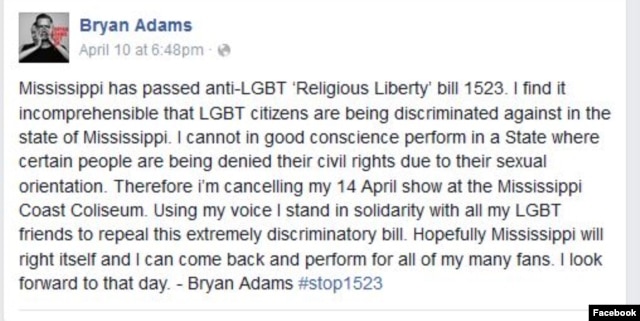
LGBT Issues Spark Broader Rights Debate in US
A debate in the United States over differences between religious beliefs and individual rights shows no signs of flagging. Laws seen as undermining LGBT rights in several southern states have sparked protests and threats of boycotts from businesses and entertainers, as well as counter-demonstrations by conservatives.
Hundreds of people gathered Monday in Raleigh, North Carolina, near the governor’s offices in a local landmark that formerly was the state Capitol building to support the state’s so-called «bathroom bill.» Signs declaring «No men in women’s bathrooms» emphasize a point in the new law that has drawn wide support among state residents who hold conservative political views.
On a nearby sidewalk, a smaller crowd of about 100 people staged a counter-protest. Their chants — «Bigotry is bad for business,» «They are preaching hate! They don’t represent our state!» — were drowned out by the larger group, according to an Associated Press reporter at the scene.
North Carolina’s Republican governor, Pat McCrory, signed into law last month an order that bathrooms and locker rooms in public schools, agencies and universities must be designated for use only by people based on their biological sex at birth. Transgender people could only use bathroom facilities matching their preferred gender identity if their birth certificates had been legally changed to reflect their gender transition.
Transgender people are often described as «individuals who have acquired the physical characteristics of the opposite sex or present themselves in a way that does not correspond with their sex at birth.»
The new North Carolina law prohibits city and local governments from separately establishing local regulations seen as accommodations to transgender people.
High-profile backlash
Democratic presidential candidate Hillary Clinton called North Carolina’s new law «shameful.» A number of high-profile businesses, including Apple and American Airlines, are threatening to withdraw from the state. Rock music legend Bruce Springsteen, who canceled a planned concert in the state Sunday, posted a message on his website: «Some things are more important than a rock show, and this fight against prejudice and bigotry — which is happening as I write — is one of them.»
Many businesses have criticized the law, but few have taken specific action against the state. The National Basketball Association and the National Collegiate Athletic Association (NCAA), which had been considering moving sporting events out of the state as a protest, have since decided not to change venues.
The North Carolina NAACP has threatened civil disobedience if the state legislature does not act to repeal the law when it comes back into session April 25.
But Marc Creech of the Christian Action League told the crowd in Raleigh this week that his organization plans to rally in support of the law when the legislature reconvenes. He denounced «a smear campaign [that] has resulted in unfounded criticism of the law.»
Principles vs. religious beliefs
North Carolina’s «bathroom bill» is one of many initiatives in states across the U.S. South that are pitting issues of lesbian, gay, bisexual and transgender (LGBT) people against individuals’ religious beliefs.
In Mississippi, protests greeted a law signed by Governor Phil Bryant one week ago. The measure allows business owners in Mississippi — caterers or photographers, for example — to refuse service to same-sex couples. It also would allow employers to determine workplace policies based on their religious beliefs.
«It’s not discriminating against anyone. People around the country may be overreacting to it,» the Republican governor said. «They need to read the bill and understand that people of faith have some rights as well in this country.»
A Mississippi state lawmaker, Jay Hughes, said Monday that he intends to work to repeal the law through «the Mississippi Economic and Tourism Recovery Act,» a bill he is sponsoring.
«Mississippi has been here before,» Hughes wrote in a post on his Facebook page. «We must give reasonable minds and the principles of democracy an opportunity to be heard. Repeal [the bill]. All Mississippians are equal.»
Canadian musician Bryan Adams, who canceled a planned show in Mississippi this week as a protest, wrote on his Facebook page: «I cannot in good conscience perform in a state where certain people are being denied their civil rights due to their sexual orientation.»
Ninety-five prominent writers, including winners of the National Book Award and the Pulitzer Prize and a former national poet laureate, wrote in an open letter of protest Monday that the law known as House Bill 1523 does not reflect Mississippi’s compassionate nature.
«This core kindness, this embracing of wildness and weirdness, is what has nurtured the great literature that has come from our state,» they wrote.
‘Sincerely held principles’
The Tennessee legislature passed a bill Monday that would allow mental health professionals to deny services based on their religious beliefs or «sincerely held principles.»
Democratic State Senator Jeff Yarbo said denying services based on religious beliefs has legal precedent, but similar exclusions for those with «sincerely held principles» is irregular and «an unheard-of concept.»
On the other side of the issue, Republican State Senator Richard Briggs, a physician from the city of Knoxville, defended the bill.
«If someone comes to me and says I want an abortion,'» Briggs said, «should I have to do that if it’s against my principles and I don’t believe [in abortion rights]?»
The state’s governor, Bill Haslam, said he will review the final text of the bill before deciding whether to sign it into law.
The Tennessee legislature designated the Bible as the official state book last week, repeating an earlier decision on the same subject. The Bible vote was seen as a repudiation of those who believe such action flouts the First Amendment of the U.S. Constitution, which guarantees the separation of church and state in the United States.


